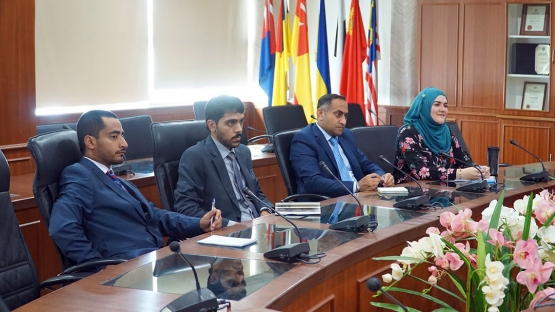Under a cooperation facilitated by the IAEA, the Malaysian Atomic Energy Licensing Board has hosted a technical visit for Lebanese and Omani atomic energy authorities to help strengthen their nuclear security practices. Malaysian experts exchanged information with their colleagues from the two countries and shared best practices and lessons learned in the development of a regulatory body responsible for nuclear security. The visit helped Lebanon and Oman consider steps involved in setting up a Nuclear Security Support Centre (NSSC), which serves as a domestic hub for training and technical and scientific support. NSSCs also foster nuclear security culture and enhance national coordination among various national authorities. The IAEA helps countries improve capacity to sustain effective national nuclear security regimes, including through NSSCs and various other measures.
In Malaysia, the regulatory frameworks for nuclear safety and nuclear security are well-coordinated with one another, resulting in a harmonized system that has proven effective, said Muzna Assi, a technical advisor at the Lebanese Atomic Energy Commission. Over years of cooperation with the IAEA, many countries have identified the need to take integrated approaches to regulatory development in order to build capacity while also optimizing efficiency. This has been especially true for developing countries that may not already have infrastructure or expertise established.
“The safety-security interface could be one of the best options during the regulatory work in our country,” said Assi. “Many representatives from developing countries are interested in this approach.”
Effective coordination among all national stakeholders is a cornerstone of Lebanon’s Integrated Nuclear Security Support Plan (INSSP), which is a tailored approach to planning for nuclear security improvements that Member States can work with the IAEA to develop. This approach, which harmonizes all aspects of planning and operation of domestic nuclear security infrastructure, helps reduce redundancy and increase efficiency throughout the entire process. The support from Malaysia was a response to Lebanon and Oman’s request to the IAEA for assistance with further implementation of their INSSPs. Such support from one developing country to another is often referred to as south-south cooperation, a framework of collaboration in the political, economic, social, cultural, environmental and technical domains. Developing countries share knowledge, skills, expertise and resources to meet their development goals through concerted efforts.
“The INSSP framework has assisted us in getting all the stakeholders involved in nuclear security in the country together,” Assi said. “It has also helped us organize the work and made it easier for the IAEA to provide the assistance we need.”
Over the years, cooperation between Malaysia and the IAEA has led to a number of similar technical visits, beginning in 2012. While they initially focused primarily on sharing information about domestic nuclear security infrastructure in Malaysia, they quickly realized that the information exchange and experience sharing goes both ways among the countries involved. For cooperation with countries that are still developing their nuclear security infrastructure, Malaysia has become a common host country due to its mature programme and well-developed nuclear security infrastructure.
“It’s a good example of a country that has gone through the experience of having to develop nuclear security infrastructure and now is in a more mature place, voluntarily working with us to share that experience and contributing to nuclear security worldwide,” said James Conner, an IAEA nuclear security officer.




